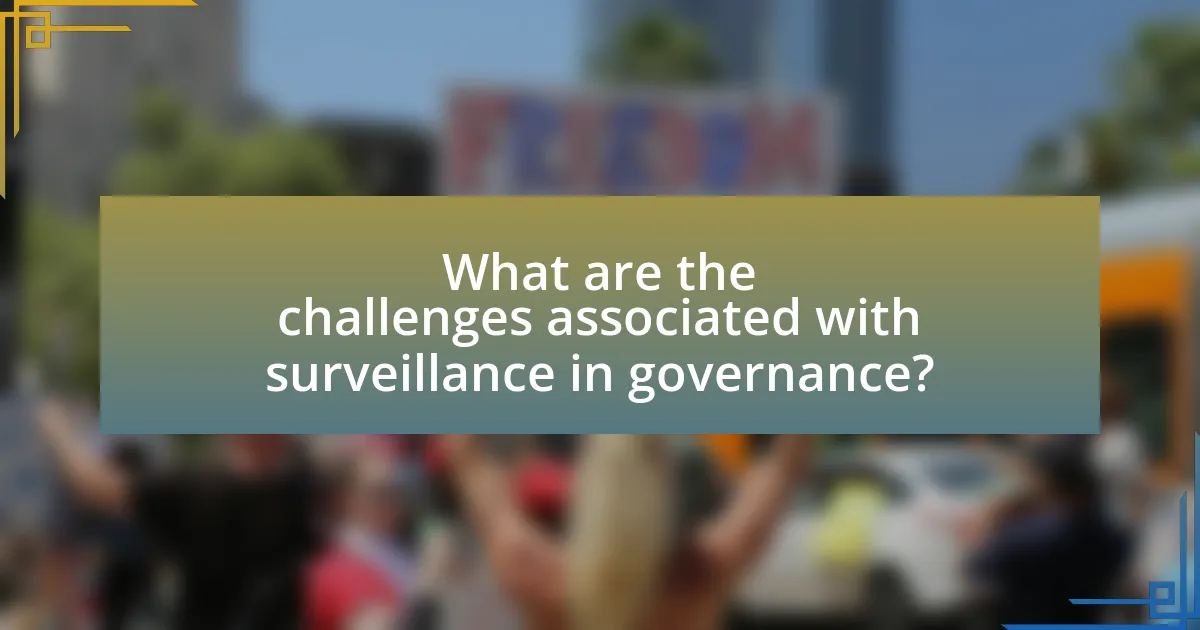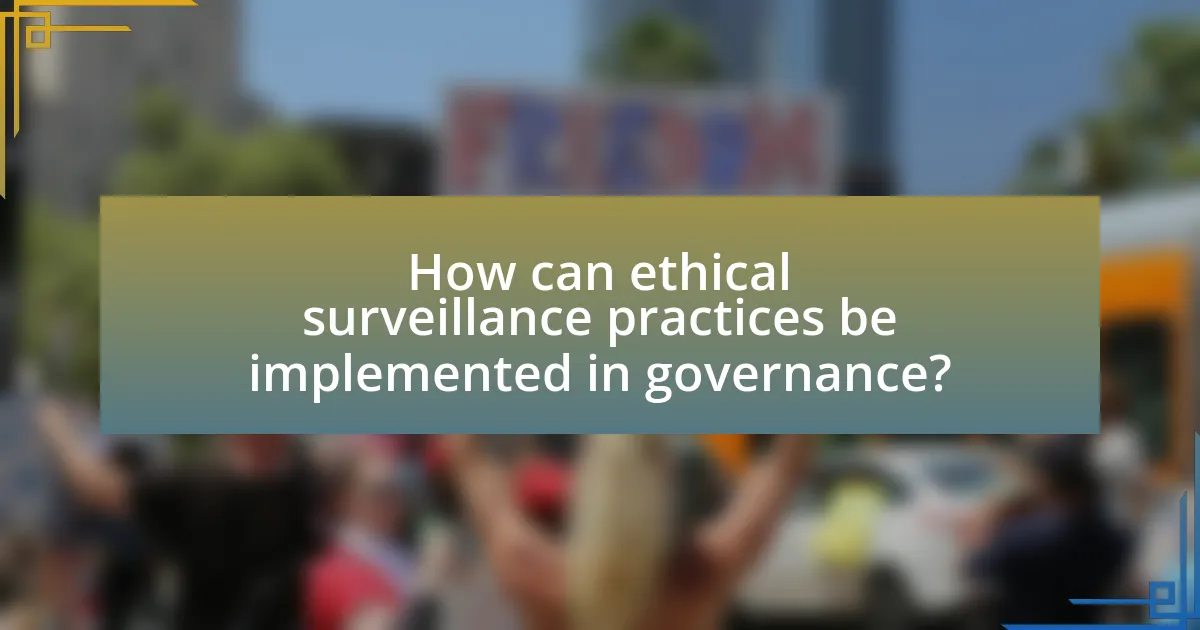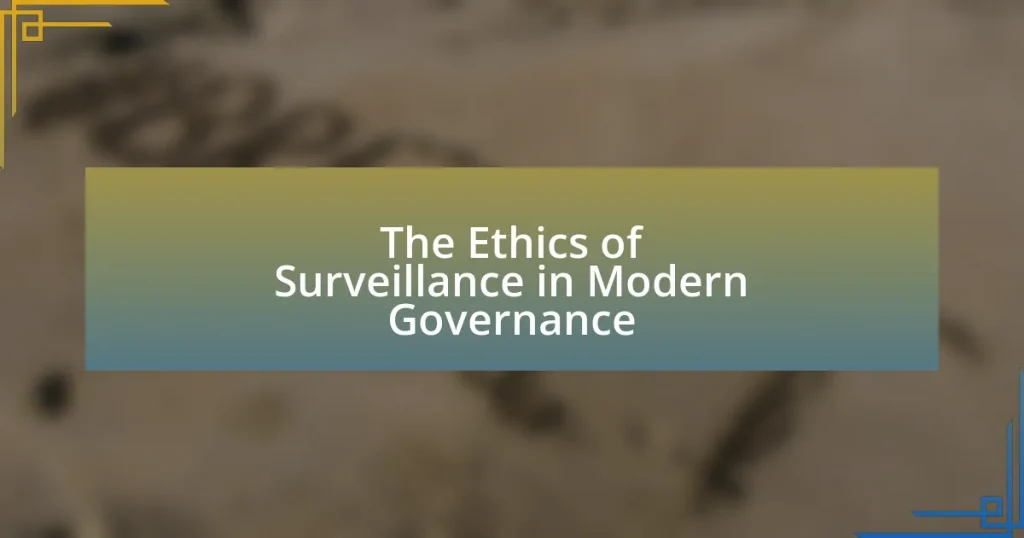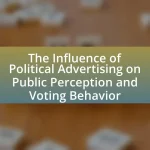The article examines the ethical implications of surveillance in modern governance, focusing on issues such as privacy violations, potential abuse of power, and the erosion of trust between citizens and the state. It discusses the impact of surveillance on individual privacy rights, the legal frameworks that govern these practices, and how cultural attitudes influence surveillance ethics. Additionally, the article explores the benefits of surveillance for public safety and governance, while addressing the challenges and risks associated with its misuse. It concludes with recommendations for implementing ethical surveillance practices that prioritize transparency, accountability, and the protection of civil liberties.

What are the ethical implications of surveillance in modern governance?
The ethical implications of surveillance in modern governance include privacy violations, potential abuse of power, and the erosion of trust between citizens and the state. Surveillance practices often infringe on individual privacy rights, as seen in cases where governments collect data without consent, leading to a chilling effect on free expression. Furthermore, the potential for misuse of surveillance data by authorities raises concerns about discrimination and targeting of specific groups, which can exacerbate social inequalities. Studies, such as those conducted by the Electronic Frontier Foundation, highlight that unchecked surveillance can lead to a significant imbalance of power, undermining democratic principles and civil liberties.
How does surveillance impact individual privacy rights?
Surveillance significantly impacts individual privacy rights by enabling the collection and monitoring of personal information without consent. This intrusion can lead to a chilling effect on free expression and association, as individuals may alter their behavior if they believe they are being watched. For instance, a 2018 study by the Pew Research Center found that 81% of Americans feel they have little to no control over the data collected about them, highlighting widespread concern over privacy erosion. Additionally, legal frameworks like the Fourth Amendment in the United States aim to protect against unreasonable searches and seizures, yet advancements in surveillance technology often outpace these protections, creating a gap that undermines individual privacy rights.
What are the legal frameworks governing privacy in surveillance?
The legal frameworks governing privacy in surveillance primarily include the General Data Protection Regulation (GDPR) in the European Union, the Fourth Amendment of the U.S. Constitution, and various national privacy laws. The GDPR establishes strict guidelines for data processing and surveillance, emphasizing individuals’ rights to privacy and data protection. The Fourth Amendment protects against unreasonable searches and seizures, requiring law enforcement to obtain warrants based on probable cause before conducting surveillance. Additionally, national laws, such as the California Consumer Privacy Act (CCPA), further regulate how personal data can be collected and used, reinforcing privacy rights in the context of surveillance. These frameworks collectively aim to balance the need for security with the protection of individual privacy rights.
How do cultural attitudes towards privacy influence surveillance ethics?
Cultural attitudes towards privacy significantly shape surveillance ethics by determining societal norms regarding acceptable levels of monitoring and data collection. For instance, in cultures that prioritize individualism and personal privacy, such as those in many Western countries, there is a strong ethical push against invasive surveillance practices, leading to stringent regulations like the General Data Protection Regulation (GDPR) in the European Union. Conversely, in collectivist cultures, such as those in parts of Asia, there may be a greater acceptance of surveillance for perceived societal benefits, influencing ethical frameworks to justify broader surveillance measures. This divergence illustrates how cultural context directly impacts the ethical considerations surrounding surveillance, as evidenced by varying public responses to government surveillance programs in different regions.
What are the potential benefits of surveillance for governance?
Surveillance can enhance governance by improving public safety, increasing accountability, and facilitating data-driven decision-making. Enhanced public safety is achieved through monitoring crime hotspots, which allows law enforcement to allocate resources effectively, as evidenced by studies showing a reduction in crime rates in areas with increased surveillance. Increased accountability arises from the ability to monitor government actions and public officials, thereby deterring corruption and misconduct; for instance, transparency initiatives in various countries have shown that surveillance can lead to improved trust in government. Finally, data-driven decision-making is supported by the collection of real-time data, which enables governments to respond swiftly to emerging issues, as demonstrated by the use of surveillance data during public health crises to track disease spread and allocate resources efficiently.
How can surveillance enhance public safety and security?
Surveillance enhances public safety and security by enabling real-time monitoring and rapid response to potential threats. For instance, the presence of surveillance cameras in public spaces has been shown to deter criminal activity; a study by the University of California, Los Angeles, found that crime rates decreased by up to 30% in areas with active surveillance systems. Additionally, surveillance technologies facilitate the identification of suspects and the gathering of evidence, which can lead to quicker law enforcement actions and increased public trust in safety measures.
What role does surveillance play in crime prevention and investigation?
Surveillance plays a critical role in crime prevention and investigation by enabling law enforcement agencies to monitor activities, gather evidence, and deter criminal behavior. The presence of surveillance cameras in public spaces has been shown to reduce crime rates; for instance, a study by the University of Cambridge found that the installation of CCTV in public areas led to a 51% reduction in crime. Additionally, surveillance technologies assist in the identification and apprehension of suspects, as evidenced by the use of facial recognition systems that have increased the efficiency of investigations. These tools not only enhance public safety but also provide valuable data that can be analyzed to understand crime patterns and allocate resources effectively.

What are the challenges associated with surveillance in governance?
The challenges associated with surveillance in governance include privacy violations, potential misuse of data, and the risk of creating a culture of mistrust. Privacy violations occur when surveillance systems collect personal information without consent, undermining individual rights. The potential misuse of data can lead to discrimination or targeting of specific groups, as seen in cases where law enforcement agencies have used surveillance data to profile individuals unfairly. Additionally, the risk of creating a culture of mistrust arises when citizens feel constantly monitored, which can erode public confidence in government institutions and hinder civic engagement. These challenges highlight the ethical dilemmas that arise when balancing security needs with the protection of civil liberties.
How does surveillance technology affect civil liberties?
Surveillance technology significantly impacts civil liberties by enabling extensive monitoring of individuals, which can lead to violations of privacy rights. The implementation of tools such as facial recognition and data collection systems allows governments and corporations to track citizens’ movements and behaviors without their consent. For instance, a report by the American Civil Liberties Union highlights that mass surveillance can chill free speech and assembly, as individuals may refrain from expressing dissenting opinions or participating in protests due to fear of being monitored. Furthermore, studies indicate that disproportionate surveillance often targets marginalized communities, exacerbating existing inequalities and undermining the principle of equal protection under the law.
What are the risks of abuse of surveillance powers by authorities?
The risks of abuse of surveillance powers by authorities include violations of privacy, misuse of data, and potential for discrimination. Authorities may overreach their legal boundaries, leading to unwarranted monitoring of individuals, which infringes on civil liberties. Historical instances, such as the NSA’s mass surveillance programs revealed by Edward Snowden, illustrate how surveillance can be misapplied, resulting in the collection of data on millions of innocent citizens without just cause. Additionally, unchecked surveillance can lead to profiling and targeting of specific groups, exacerbating social inequalities and fostering a culture of fear and mistrust among the populace.
How can surveillance lead to discrimination or profiling?
Surveillance can lead to discrimination or profiling by enabling the systematic monitoring of specific groups based on race, ethnicity, or socioeconomic status. This targeted observation often results in biased data collection, where individuals from marginalized communities are disproportionately scrutinized, leading to unfair treatment and assumptions about their behavior. For instance, studies have shown that law enforcement agencies frequently use surveillance technologies in ways that disproportionately affect minority populations, reinforcing existing stereotypes and perpetuating social inequalities. The American Civil Liberties Union (ACLU) has documented instances where surveillance practices have led to racial profiling, highlighting the ethical concerns surrounding the use of such technologies in governance.
What are the implications of mass surveillance on society?
Mass surveillance has significant implications for society, primarily affecting privacy, civil liberties, and social trust. The pervasive monitoring of individuals can lead to a chilling effect on free expression, as people may self-censor their thoughts and actions due to fear of being watched. Research by the Electronic Frontier Foundation indicates that mass surveillance can disproportionately target marginalized communities, exacerbating social inequalities. Furthermore, studies show that when citizens perceive they are under constant surveillance, their willingness to engage in civic activities declines, undermining democratic participation. These factors collectively illustrate how mass surveillance can erode the foundational principles of a free and open society.
How does mass surveillance affect trust in government institutions?
Mass surveillance significantly undermines trust in government institutions by fostering a perception of invasion of privacy and potential abuse of power. When citizens are aware that their communications and activities are being monitored, they may feel that their personal freedoms are compromised, leading to skepticism about the government’s intentions. Research conducted by the Pew Research Center in 2014 found that 54% of Americans felt that the government was overreaching in its surveillance efforts, indicating a widespread concern about privacy violations. This erosion of trust can result in decreased civic engagement and compliance with laws, as individuals may view the government as an adversary rather than a protector of their rights.
What are the psychological effects of being under constant surveillance?
Being under constant surveillance can lead to significant psychological effects, including increased anxiety, stress, and a sense of paranoia. Research indicates that individuals who know they are being watched may experience heightened levels of self-consciousness and fear of judgment, which can result in diminished mental well-being. A study published in the journal “Psychological Science” found that constant monitoring can lead to a decrease in creativity and willingness to take risks, as individuals may feel constrained by the presence of observers. Furthermore, the phenomenon of “surveillance fatigue” can occur, where individuals become desensitized to monitoring, potentially leading to disengagement and apathy. These psychological impacts highlight the complex relationship between surveillance and individual mental health, emphasizing the need for ethical considerations in governance practices.

How can ethical surveillance practices be implemented in governance?
Ethical surveillance practices can be implemented in governance by establishing clear legal frameworks that prioritize transparency, accountability, and citizen privacy. These frameworks should include regulations that define the scope and purpose of surveillance, ensuring that data collection is necessary and proportionate to the intended goals. For instance, the General Data Protection Regulation (GDPR) in the European Union sets strict guidelines on data handling and individual rights, serving as a model for ethical governance. Additionally, involving stakeholders, including civil society and experts, in the policymaking process can enhance public trust and ensure diverse perspectives are considered. Regular audits and independent oversight mechanisms can further ensure compliance with ethical standards, as seen in various jurisdictions that mandate third-party reviews of surveillance practices.
What best practices should be adopted for ethical surveillance?
Best practices for ethical surveillance include transparency, accountability, and data minimization. Transparency involves informing the public about surveillance practices and the purposes behind them, which fosters trust and allows for informed consent. Accountability requires establishing clear policies and oversight mechanisms to ensure that surveillance activities are conducted lawfully and ethically, as seen in the implementation of oversight bodies in various jurisdictions. Data minimization mandates that only necessary data be collected and retained for the shortest time possible, reducing the risk of misuse and protecting individual privacy. These practices are supported by frameworks such as the General Data Protection Regulation (GDPR), which emphasizes the importance of protecting personal data and privacy rights.
How can transparency and accountability be ensured in surveillance operations?
Transparency and accountability in surveillance operations can be ensured through robust oversight mechanisms, public reporting, and clear legal frameworks. Oversight bodies, such as independent review boards, can monitor surveillance practices and ensure compliance with laws and ethical standards. Public reporting on surveillance activities, including the number of surveillance requests and their outcomes, fosters trust and allows for community scrutiny. Additionally, establishing clear legal frameworks that define the scope and limits of surveillance helps protect citizens’ rights and ensures that operations are conducted within established guidelines. For instance, the USA PATRIOT Act includes provisions for oversight and accountability in surveillance, demonstrating a legislative approach to these principles.
What role do public consultations play in shaping surveillance policies?
Public consultations play a crucial role in shaping surveillance policies by facilitating community engagement and ensuring that diverse perspectives are considered in the decision-making process. These consultations allow policymakers to gather input from citizens, advocacy groups, and experts, which can lead to more transparent and accountable surveillance practices. For instance, the European Union’s General Data Protection Regulation (GDPR) emphasizes the importance of public consultation in developing data protection policies, reflecting a commitment to incorporating public opinion into governance. This process not only enhances the legitimacy of surveillance policies but also helps to address public concerns regarding privacy and civil liberties, ultimately leading to more balanced and ethical governance.
What are the future trends in surveillance ethics and governance?
Future trends in surveillance ethics and governance will increasingly focus on transparency, accountability, and the protection of individual privacy rights. As technology advances, there is a growing demand for clear regulations that govern the use of surveillance technologies, such as facial recognition and data collection. For instance, the European Union’s General Data Protection Regulation (GDPR) has set a precedent for stringent data protection laws, influencing global standards. Additionally, public discourse around surveillance practices is shifting towards prioritizing ethical considerations, with organizations advocating for ethical frameworks that guide the deployment of surveillance technologies. This trend is supported by research indicating that citizens are more likely to trust governance systems that prioritize ethical surveillance practices, as evidenced by surveys showing a significant percentage of the population concerned about privacy violations.
How might emerging technologies reshape the ethics of surveillance?
Emerging technologies are likely to reshape the ethics of surveillance by enhancing data collection capabilities and increasing the potential for misuse. For instance, advancements in artificial intelligence and facial recognition technology enable more precise tracking of individuals, raising concerns about privacy violations and consent. A study by the Electronic Frontier Foundation highlights that these technologies can lead to disproportionate targeting of marginalized communities, thereby exacerbating existing social inequalities. Furthermore, the integration of big data analytics allows for the aggregation of personal information from various sources, complicating the ethical landscape by blurring the lines between security and personal freedom. These developments necessitate a reevaluation of existing ethical frameworks to address the implications of pervasive surveillance in society.
What proactive measures can be taken to safeguard privacy in the digital age?
To safeguard privacy in the digital age, individuals and organizations can implement several proactive measures, including using strong encryption for data protection, regularly updating software to patch vulnerabilities, and employing privacy-focused tools such as virtual private networks (VPNs) and secure browsers. Strong encryption ensures that sensitive information remains unreadable to unauthorized users, while regular software updates mitigate risks from known security flaws. Additionally, utilizing VPNs masks users’ IP addresses, enhancing anonymity online, and secure browsers limit tracking by blocking third-party cookies. According to a 2021 report by the Electronic Frontier Foundation, using these tools significantly reduces the risk of data breaches and unauthorized surveillance, thereby reinforcing the importance of proactive privacy measures in the digital landscape.
What practical steps can individuals take to protect their privacy in a surveillance-heavy environment?
Individuals can protect their privacy in a surveillance-heavy environment by employing various strategies. First, using encryption tools for communication, such as Signal or WhatsApp, ensures that messages remain private and secure from unauthorized access. Second, utilizing virtual private networks (VPNs) masks users’ IP addresses, making online activities less traceable. Third, individuals should regularly update their software and devices to protect against vulnerabilities that could be exploited by surveillance technologies. Additionally, being mindful of the information shared on social media and adjusting privacy settings can limit exposure to surveillance. Lastly, using privacy-focused browsers like Brave or Firefox with tracking protection can help reduce data collection by third parties. These steps are supported by studies indicating that encryption and VPN usage significantly enhance online privacy and security.















